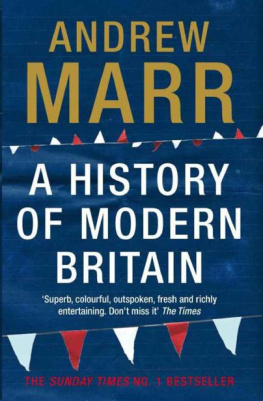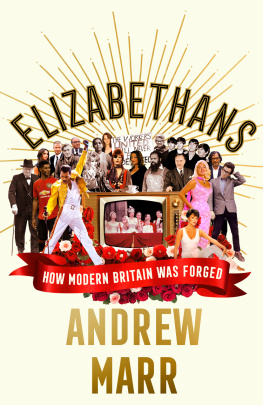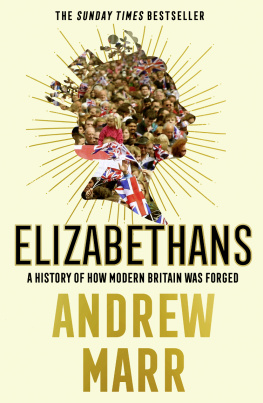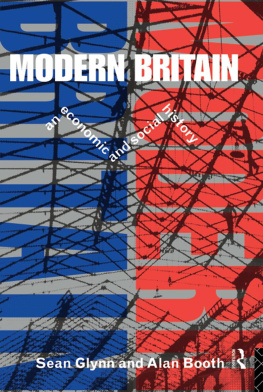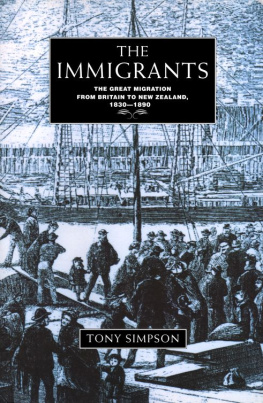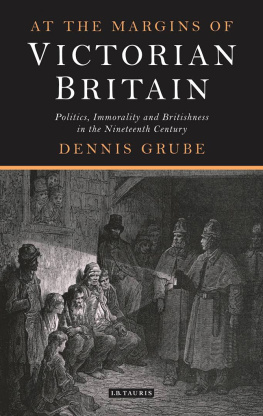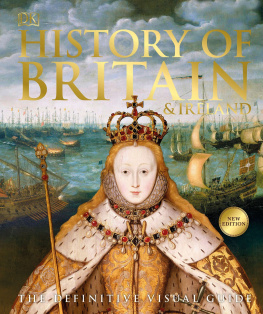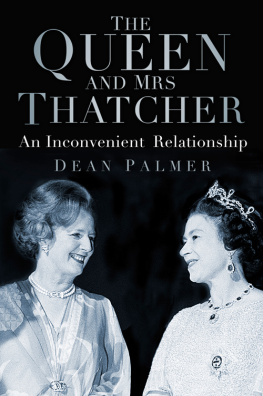Praise for A History of Modern Britain
Marrs writing is persuasive, liberal and energised... His grasp of recent politics and economics is superbly authoritative, never better than when discussing our changing relationship with the United States
Observer
Marr excels at brief, droll pen portraits of the major players. His language is vivid and powerful, enlivened with a sparky wit... Despite its great size, this is a stimulating and witty account of the forces that made our age by a man who somehow manages to be a well-informed insider without sacrificing the perspective of those outside the Westminster village. Its written from the perspective of someone who travels around the country, who thinks and who listens
Scotland on Sunday
Richer and deeper than television commentary can ever hope to be. As popular history, it is a lively and enjoyable, as well as a solid, achievement. He is fair and humane in his judgement of men and events
Daily Mail
As in the days when he was the BBCs chief political editor, it is the clarity of his judgements, the arresting insights and the irrepressible wit that keep us hanging on to his words... It is a measure of Marrs professionalism that his judgements inspire the kind of trust which Tony Blair and his allies squandered through spin and outright lies
Literary Review
Marr is shrewd enough to know that yet another irenic trot through what is in outline an overly familiar story may risk what he himself calls autistic repetitiveness. So his invigorating method is to adopt what you might call the Ben Schott approach to history, piling up interesting detail, often through quotation, and hoping, quite correctly, that it will do more work than windy generalisation
Guardian
Marr is, predictably, at his best when discussing politics, with his keen understanding of economic policy and his feel for the Westminster world of ambition, conspiracy and rivalry... he excels in providing compelling summaries of leading political figures
Sunday Telegraph
Marr has a gift for narrative and prcis, a pithy turn of phrase and an ability to unearth the unfamiliar, and he is passionately engaged with his subject
The Times
A History of Modern Britain
Andrew Marr was born in Glasgow. He graduated from Cambridge University and has enjoyed a long career in newspaper journalism, working for the Scotsman, the Independent, the Economist, the Express and the Observer. From 2000 to 2005, he was the BBCs political editor. He presents the imaginatively titled Andrew Marr Show on BBC1 on Sunday mornings. His broadcasting includes BBC2s series A History of Modem Britain, political documentaries for Channel 4 and BBC Panorama, and Radio 4s Start The Week.
Also by Andrew Marr
MY TRADE
A Short History of British Journalism
Andrew Marr
A HISTORY OF
MODERN BRITAIN
PAN BOOKS

First published 2007 by Macmillan
First published in paperback 2008 by Pan Books
This electronic edition published 2009 by Macmillan
an imprint of Pan Macmillan Ltd
Pan Macmillan, 20 New Wharf Rd, London N1 9RR
Basingstoke and Oxford
Associated companies throughout the world
www.panmacmillan.com
ISBN 978-0-330-51330-2 in Adobe Reader format
ISBN 978-0-330-51329-6 in Adobe Digital Editions format
ISBN 978-0-330-51330-2 in Mobipocket format
Copyright Andrew Marr 2007
The right of Andrew Marr to be identified as the author of this work has been asserted by him in accordance with the Copyright, Designs and Patents Act 1988.
By arrangement with the BBC. The BBC logo is a trademark of the British Broadcasting Corporation and is used under licence. BBC logo copyright BBC 1996.
You may not copy, store, distribute, transmit, reproduce or otherwise make available this publication (or any part of it) in any form, or by any means (electronic, digital, optical, mechanical, photocopying, recording or otherwise), without the prior written permission of the publisher. Any person who does any unauthorized act in relation to this publication may be liable to criminal prosecution and civil claims for damages.
A CIP catalogue record for this book is available from the British Library.
Visit www.panmacmillan.com to read more about all our books and to buy them. You will also find features, author interviews and news of any author events, and you can sign up for e-newsletters so that youre always first to hear about our new releases.
Contents
Part One
HUNGER AND PRIDE: BRITAIN AFTER THE WAR
Part Two
THE LAND OF LOST CONTENT
Part Three
HAROLD, TED AND JIM: WHEN THE MODERN FAILED
Part Four
THE BRITISH REVOLUTION
Part Five
NIPPY METRO PEOPLE: BRITAIN FROM 1990
Introduction to the Paperback Edition
One Year On
A year has passed since this book was first published in hardback. How much has changed? How do the judgements stand up? The big theme of the story that follows is the defeat of politics by shopping. The surging consumer economy has been by turns exhilarating, wasteful, liberating and narrowing. Nobody who escaped the grey years of rationing, queues and shortages should snootily dismiss the triumph of shopping; yet nobody who looks at our dead-eyed obsession with buy-and-throw newness can be comfortable either. Britains shopping economy, shorn of most of its industry, has produced a country which is more crowded, cleaner and richer (far richer) than it used to be, but which is also more vulnerable to shocks from outside. Consumerism has shouldered aside other ways of understanding the world real political visions, organized religion, a pulsing sense of national identity.
Yet during 2007, the biggest change was a darkening of the national mood. It is not just global warming, but a sense that the good times are not, after all, forever. The decade-long BlairBrown boom has been based on cheap imports from China, on very high levels of borrowing secured by upward-spiralling house prices, and on cheap, skilled migrant labour from Eastern Europe. None of these things are indefinitely sustainable. As this book shows, our recent prosperity is partly the achievement of politicians who are now almost forgotten. But after ten years in which New Labour had enjoyed the political fruits of strong, low-inflationary growth, many of us think we can see the buffers looming out of the mist.
This is recent. Early in 2007 house prices were still strongly rising. The stock market was at a six year high. Economists and opposition parties were warning about the government being overborrowed, and about private debt. But nobody paid much attention. In the City the big banks still reported huge profits. There were mysterious characters called private equity investors and hedge fund managers. Few people really understood what they were up to, except that it was all very clever and complicated. The banks were paying astronomical bonuses to their managers. And for the majority, in the shops, clothes and gizmos were ludicrously cheap. A Western economy based on high debt, both private and public, ensured cash was there to keep the spree going. But the intricate and always-shifting tangle of loans, bets, guesses and 80-proof, chill-filtered optimism that is modern global finance, was about to suffer a reality check. And if reality check is an ugly American phrase, then it is perhaps not as ugly as another which entered the Queens English in 2007. Sub prime is jargon for bad loans the mortgages and other pricey money offers to ordinary Americans who had no proper security and in many cases no way of paying it back. This overborrowing, mere greed by the banks, had been causing worries on Wall Street as early as February 2007. We have known since the Great Crash of 1929 that a global economy transmits problems from one country to another through the banking system very fast. We are supposed to have a stabler world trading system these days. But what has also changed is that bad debts have been bundled up and sold around like sacks of plastic casino counters between banks so many times that nobody knows just who is in trouble, and for how many billion dollars. In great US institutions like Merrill Lynch, Morgan Stanley and Citigroup, the one-time wizards started to lose their jobs.

